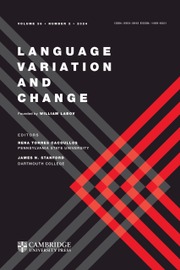Article contents
Why DO dove: Evidence for register variation in Early Modern English negatives
Published online by Cambridge University Press: 16 September 2005
Abstract
The development of “supportive” (or “periphrastic”) DO in English suffered a curious and sharp reversal late in the 16th century in negative declaratives and questions according to Ellegård's (1953) database, with a recovery late in the following century. This article examines the variation between DO and the full verb in negative declaratives in this database, from 1500 to 1710. It is shown that both register variation and age-grading are relevant, and that the periods 1500–1575 and 1600–1710 have radically distinct properties. The second period shows substantial age-grading, and is interpreted as having introduced a fresh evaluative principle governing register variation. Negative questions supply data that suggest that the development of clitic negation may have been implicated in the development of the new evaluation. This change in evaluation accounts for the apparent reversal in the development of DO, and we can abandon the view that it was a consequence of grammatical restructuring.I want very sincerely to thank Tony Kroch for giving me an electronic version of the database used by Ellegård (1953), in an act of straightforward generosity; also Ann Taylor for her work in compiling it, and Celeste Tereszczuk who completed this task. I am also grateful to the British Academy who funded a period of research leave which gave me time to investigate this, and to audiences at ICEHL 12 (held at the University of Santiago), at the Linguistics Research Seminar at the University of York, and at NWAVE 32 for their comments.
- Type
- Research Article
- Information
- Copyright
- © 2005 Cambridge University Press
References
REFERENCES
- 12
- Cited by


